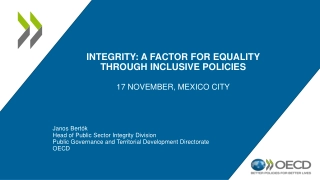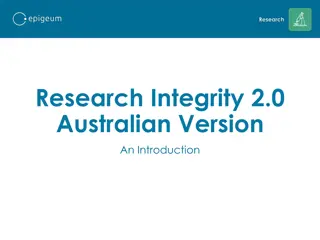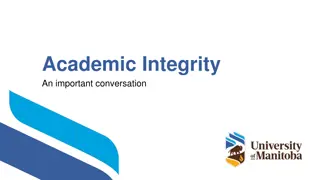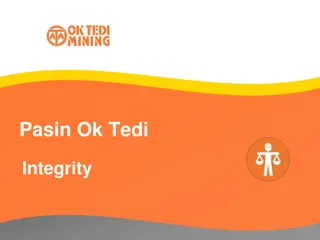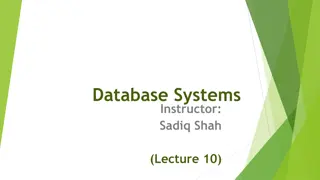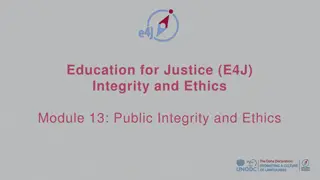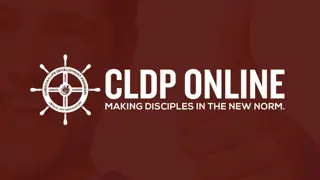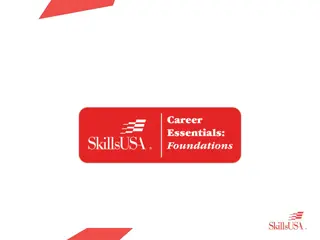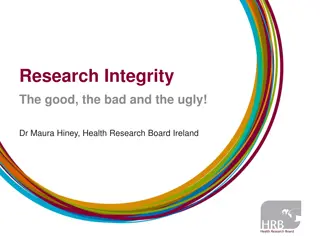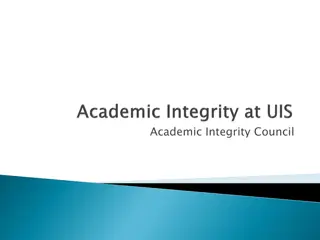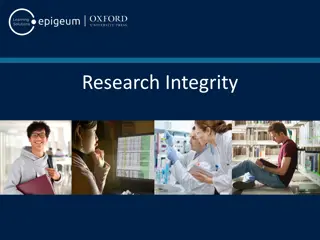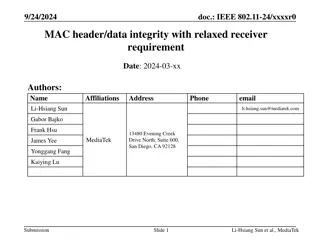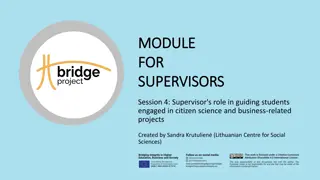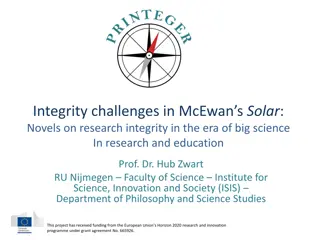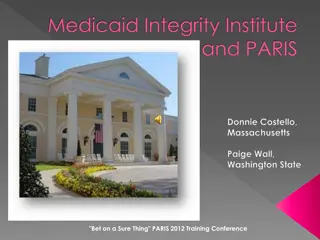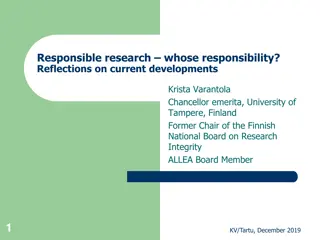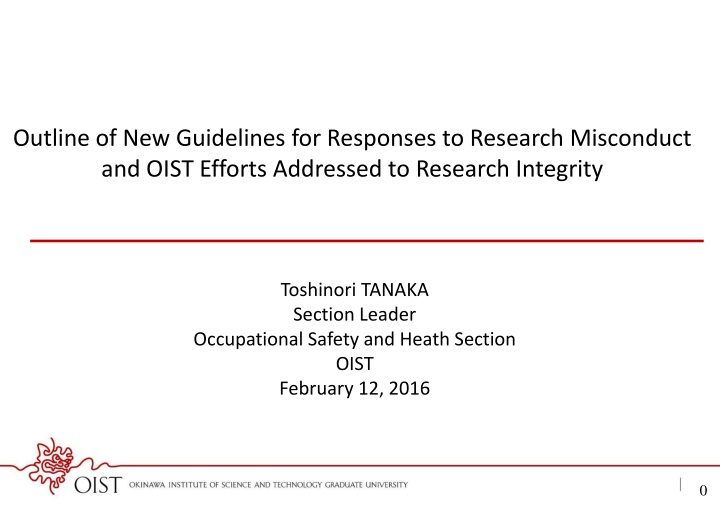
Guidelines for Responding to Research Misconduct and OIST Efforts
Explore the outline of new guidelines addressing research misconduct and OIST efforts led by Toshinori Tanaka at OIST. Learn about the background, formulation process, and efforts towards promoting research integrity.
Download Presentation

Please find below an Image/Link to download the presentation.
The content on the website is provided AS IS for your information and personal use only. It may not be sold, licensed, or shared on other websites without obtaining consent from the author. If you encounter any issues during the download, it is possible that the publisher has removed the file from their server.
You are allowed to download the files provided on this website for personal or commercial use, subject to the condition that they are used lawfully. All files are the property of their respective owners.
The content on the website is provided AS IS for your information and personal use only. It may not be sold, licensed, or shared on other websites without obtaining consent from the author.
E N D
Presentation Transcript
Outline of New Guidelines for Responses to Research Misconduct and OIST Efforts Addressed to Research Integrity Toshinori TANAKA Section Leader Occupational Safety and Heath Section OIST February 12, 2016 0
1. Background of Formulation of Guidelines for Responding to Misconduct in Research (New Guidelines) 2. Outline of the New Guidelines 3. OIST Efforts Addressed to Promotion of Research Integrity 1
1 Background of the New Guidelines Code of Conduct for Scientists (Revised Version) (2013) Guidelines for Responding to Misconduct in Research Activities (2006) Task Force on Misconduct in Research and Misuse of Research Funds (2013) Guidelines for Responding to Misconduct in Research (2014) Minister's Decision MEXT Special Committee Code of Conduct for Scientists (2006) Science Council of Japan Science Council of Japan Research Misconduct: Fabrication, falsification, plagiarism, duplicate submission , inappropriate authorship Substantial regulations for research institutions 5 sequences are similar Paper #3 Figure 2(B) Paper #9 Figure 1(B) Paper #4 Figure 1(B) STAP CELL SCANDAL REUSE OF DATA ON DIFFERENT PAPERS 2
2 Outline of the New Guidelines Guidelines for Responding to Misconduct in Research Minister's Decision Intensive information activities in councils, academic societies and briefings by directors and staff members of the office of MEXT Universities prioritized the efforts to meet the demands of the new Guidelines, as an urgent task addressed by the top-management level Appointment of faculty members, staff members and offices that are specially assigned to this task Symposiums and seminars relating to this task Urgent need of adding an undergraduate course and a department or a post graduate educational curriculum on responsible conduct of research 3
2 Outline of the New Guidelines (Direction of Revision) There is a general tendency of lack of adequate education on research manners and researchers' ethics Some of the researchers who are in the position of giving research guidance are not fully aware of their duties and responsibilities Some point out that there are problems of preventing a healthy autonomous system for eliminating misconduct in the scientific community, due to rapid introduction of competitive environment, advancing subdivision and specialization of research area and growing complexity and diversity in the system for research activities. Past practices in the efforts of preventing misconduct had heavily relied on self-discipline and responsibility of individual researchers Data are not adequately stored in such a manner that contributes to the prevention of misconduct and to the defense of researchers themselves in case of allegation of misconduct, while ensuring verifiability of research results by third parties. The new Guidelines have been formulated as a decision of the Minister of Education, Culture, Sports, Science and Technology. Conventionally, responses to misconduct in research activities had heavily relied on a sole responsibility of individual researchers, but from now, research institutions will be more actively and responsibly involved in the process of preventing misconduct. 4
2 Outline of the New Guidelines (Basic Policies) Basic attitudes toward misconduct Misconduct in research activities contradicts to the nature of research activities and publication of results thereof, and betrayal of science itself. Not only individual researchers but also research institutions are required to take strict attitudes against misconduct. Autonomy and self-discipline of researchers, scientific community, etc. Responses to misconduct must be based primarily on the self-discipline of individual researchers and as a self-correction system based on autonomous decision-making of the scientific community or each research institution. Managerial responsibilities of research institution Research institutions actively and responsibly involve in the prevention of misconduct and create an environment that discourages acts of misconduct. In particular, efforts addressed to the clarification of management responsibility by establishing an organizational system for assuming responsibilities and the prevention of misconduct must be promoted. Clarification of divisions of roles and responsibilities among individual researchers, etc. in collaborative research Appropriate checking of research outcome by PIs who are responsible for putting together the whole picture of research activities by team Provision of appropriate advices and supporting environment that encourages young researchers, etc. to perform research activities independently (e.g., providing mentors) 5
2 Outline of the New Guidelines (Misconduct/Institutional Rules ) Misconduct in the scope of application of the Guidelines Fabrication, falsification and plagiarism relating to data, findings of study and the like which are present in research results published in a paper submitted to academic journals, which are caused by a willful act or gross negligence of basic duty of care that must have been exercised by an ordinary researcher. *Fabrication, falsification and plagiarism Specified Misconduct Development and publication of institutional rules and systems in research institutions and funding agencies Development and publication of institutional rules on the procedures and methods for investigation in case of a Specified Misconduct allegation: Clarification of a person in charge of responses to misconduct, and identification of roles and scope of responsibility of the person in charge. Strict control of confidentiality of whistleblowers and others and clarification of specific procedures after whistleblowing. Obligation to submit reports to MEXT, etc., regarding investigation on Specified Misconduct. 6
2 Outline of the New Guidelines (Efforts of Each Institution) Developing the environment for preventing misconduct Increasing awareness in researchers ethics through research ethics education Research institutions: Develop necessary organizational systems including appointment of a "Research Ethics Education Officer" and provide periodical Research Ethics Education for a wide range of people who engage in research activities. Universities: Promote Research Ethics Education to their students, in order to increase awareness in compliance regarding researchers ethics among students. Funding agencies: Ensure completion of a program relating to Research Ethics Education by all researchers who participate in the research activities based on the competitive research funding, and ensure confirmation of completion of the Research Ethics Education. Storage of research data for a certain period of time and disclosure thereof by research institutions Making a list of misconduct cases to be available to public announcement MEXT makes a list of cases being confirmed to be misconduct and makes the list publicly available. 7
2 Outline of the New Guidelines (Whistleblowing and Investigation ) Receiving allegations of specified misconduct and investigating alleged cases Procedures and methods including receiving allegations of specified misconduct, investigation, determination, appeal and public announcement of results of the investigation to investigating alleged: Designate a contact point for allegations and consultations, and fully inform of the contact point. *The services of the contact point may be commissioned to a third party by a contract. Prescribe a standard period of time for investigation in research institutions Organize an investigatory committee, in which at least half of the members are external expert members (also stipulate exclusion of interested parties). When the investigatory committee finds it necessary, provide an opportunity for reproductive experiment, under the direction/supervision of the investigatory committee. If a new decision that requires expert knowledge needs to be made in an appeal, the review will be conducted by replacing or adding members of the investigatory committee. 8
2 Outline of the New Guidelines (Penalties) Measures against researchers and research institutions regarding specified misconduct Refund competitive research funding relating to specified misconduct(*). Restrictions on qualifications for applying for and participating in competitive research funding(*). (*it applies to misconduct in research activities carried out based on basic expenses such as operating expense subsidy, as well as competitive research funding.) Measures for research institutions regarding managerial responsibility as an organization Ensuring development of responsible organizational structure MEXT imposes a "supervised condition" if it confirms a deficiency in the development of organizational structure or system, etc. for responding to misconduct. MEXT takes countermeasures for non-compliance with the supervised condition, such as reduction of "overhead expenses"for the institution. Ensuring speedy investigation Reduction of "overhead expenses" if investigation relating to specified misconduct is delayed without justifiable cause. 9
2 Outline of the New Guidelines (Publication of Misconduct Case) Purposes Preventing misconduct through self-learning by researchers and other relevant members. Utilizing in responses in case of finding occurrence of misconduct in the research institution. Cases subject to publication Cases for which a report of Specified Misconduct (fabrication, falsification or plagiarism) was received on or after April 2015. Misconduct in research activities such as duplicate submission and inappropriate authorship is also responded to in a same manner as the above. Items subject to publication Uploaded to the MEXT website Investigation systems, investigation methods , results of investigation in the research institution Reason why a determination of misconduct was made Factors that fostered the occurrence of the misconduct and measures for preventing another misconduct case. Measures taken by research institutions and funding agencies 10
2 Outline of the New Guidelines (MEXT Status Survey) Purposes Contributing to the promotion of research activities with integrity in each research institution, by collecting information on the progress of the development of institutional systems and other efforts that may be referred to by other research institutions, and publicly announcing the same. Survey methods Document survey: Complete enumeration survey Field survey: Selecting institutions to be subject to the survey from the following: Research institutions ranked in higher positions on the number of selected proposals for Grant-in-Aid Research institutions that had reported a misconduct case in the past. Survey items Policies, etc. on the efforts responding to misconduct in research activities Progress of the development of institutional systems Progress of efforts addressed to foster awareness of research ethics Storage of research data and disclosure thereof Progress of measures for responding to Specified Misconduct such as designation of a contact point for consultation and receiving allegation and development of institutional rules Future plan Results of the status survey will be formulated into a report and be available to public around March this year. 11
2 Outline of the New Guidelines (Compared with Other Countries) ENrio (Oct. 2012) "Mode of Regulation" National Commissions with legal mandate (Denmark) National Advisory bodies (Germany, UK, Netherlands, etc.: 11 states*) *Including Norway. HAL Typology (2009) Type Centralized national legislative system with legal mandate (U.S., Denmark, Norway) An organization constituted by non- legislated body, for undertaking supervision over research funding agency and each research institution. Independent research integrity monitoring organization or a system that lacks compliance functions. Is Japan Type 1.5? Guidelines closer to legislation National governments conduct survey on efforts of each research institution and make any research misconduct cases available to public 1 Type 2 Type Local Commissions (France, Belgium, Ireland, etc.: 5 states) 3 (Note) Descriptions of the table are based on the commentary of a report (2010) by CCA. (Note) Information on Enrio was prepared based on the reference (10/2012) prepared by the Austrian agency for research integrity (OeAWI) Source: Matsuzawa, "Joho-kanri (Information Management)", January 2014; partially modified. 12
3 OIST Efforts Addressed to Promotion of Research Integrity (CITI Japan Project) Shinshu Univ. Tokyo Med. & Dent. Univ. Sophia Univ. CITI Japan Project A collaborative project of 6 universities including OIST for developing, creating and propagating educational materials on research ethics that meet global standards and conform to Japanese legal frameworks and guidelines, culture and custom and views, based on materials which have been widely used in the world, particularly in the US. Learning materials are provided online. Fukushima Med. Univ. Kitasato Univ. OIST 13
3 OIST Efforts Addressed to Promotion of Research Integrity (CITI Japan Project) FY2014 Project Implementation Structure Project Administrator Yoshimitsu Fukushima (Shinshu Univ.) Steering Committee External Review Committee Tokyo Med. & Dent. Univ., Shinshu Univ., Fukushima Pref. Med. Univ., Kitasato Univ., Sophia Univ. and OIST Makoto Asashima, Director (JSPS) Tomoaki Tsuchida, Professor (Waseda Univ.) Kiyoshi Aoki, Professor (Sophia Univ.) Ellen Clayton, Professor (Vaderbilt Univ.) Sergio Utewka, Professor (Miami Univ.) Deputy Project Administrator - Deans of collaborator univs. - Iekuni Ichikawa (Shinshu Univ.) Project Supporting Organization: Business Department, School of Medicine, Shinshu Univ. Users' meeting (annually) Cooperative organizations AJMC Collaborator universities Shinshu Univ. Sophia Univ. Kitasato Univ. OIST Tokyo Med. & Dent. Univ. Fukushima Pref. Med. Univ. "Research activities with responsibility" "Handling of Animal Experiments" "Materials for Engineering Fields" Consistency of materials from legal and ethical standpoints "Human Genome Research" English materials for international students "Human Subjects Research" JMA/JAMS "Research Safety" JAXA Operation policy meeting, editorial meeting, CITI international collaboration activities Liaison Conference for Gene Therapy fields Material preparation/revision, CITI enlarged body members, promotion activities *FY2014 reviewers are mainly included in the list. External cooperators Narifumi Kudo (Tohoku U.), Masamichi Hayashi (Kogakuin U.), Masafumi Ata (Osaka U.), Masaki Nakamura (Osaka U.), Norio Higuchi (Tokyo U.), Koichi Miki (Keio U.), Hideyuki Murakami (NIMS), Ryuji Koike (Tokyo Med. & Dent. U.), Yoshitomo Nakano (Hiroshima U.), Shimon Tashiro (Showa U.), Yoshinobu Kitamura (Sophia U.), Masaharu Yano (Tokyo U.), Eisuke Enoki (Kinki U.), Minoru Kimura (Tokai U.), Kenichi Natsume (Kanazawa Inst. of Tech.), Hidenori Kaketani (Tsukuba U.), Tomoki Kinoshita (ACSES), Ichiro Kanaya (Osaka U.), Minoru Maruyama (Shinshu U.), Shizuaki Murata (Nagoya U.), Noriko Osumi (Tohoku U.), Shunichi Yamashita (Nagasaki U.), Syunsuke Ikeda (emeritus atTokyo Inst. of Tech.),, Yoshito Oshima (Tokyo U. Graduate School), Tetsuji Iseta (Kyoto U.), Satoshi Kodama (Kyoto U.), Yukio Sudo (JRIA), Yukito Kobayashi (Kumamoto Inst. of Tech.), Kiyoshi Tamada (Shinshu U.), Hiroo Katakura (Kansai U.), Tsunakuni Ikka (Kyoto pref. Mded. U.), Kotobu Nagai (EAJ), Yosuke Takahama (tokushima U.), Takashi Agui (Hokkaido U.), Masahiko Ichii (JANU), Kouichi Sumikura (GRIPS), Fujie Tanaka (OIST), Makoto Suzuki (OIST), Tetsunosuke Kunitomo (Toray Medical), Sumio Ozeki (Shinshu U.), Masamichi Kinomoto (BMSA), Kazuyoshi Sugiyama (NIID), Yasuharu Sugimoto (T. Sugimoto Gijutsushi Office), Atsushi Ito (Tokyo U.), and Masamitsu Tamura (emeritus at Tokyo U.) 14
3 OIST Efforts Addressed to Promotion of Research Integrity (CITI Japan Project) Areas of materials Material preparation working group (Japanese version) *1 US CITI materials English Materials Drafter *2 CITI Japan project secretariat CITI Japan Project Steering Committee (Determination of reviewers, schedule coordination for material preparation, etc.) Comments from society *3 External review committee, liaison conference, public comment procedures *5, etc. Sphia University Flesh out with Japanese law, guidelines and culture Module subcommittees *4(review/discussion) Reviewer Reviewer Reviewer Project Secretariat Preparing English version Collegial body of basically 3 reviewers, 1 meeting Project Steering Committee Confirmation and approval of finalized materials OIST Public Comment procedures *5 Material preparation working group (finalizing) CITI Japan materials Inserting illustrations, proofreading, online formatting US CITI (reviewing) 15
3 OIST Efforts Addressed to Promotion of Research Integrity (CITI Japan Project) List of current learning materials: Responsible conduct of research A complete version A digest version Research safety Chemical materials Radioactive materials Biosafety Human subjects research Handling of lab animals GCP (clinical trials) All materials are provided via e-learning system Course completion and understanding checking by quizzes 16
3 OIST Efforts Addressed to Promotion of Research Integrity (CITI Japan Project) 2015.12.14 17
3 OIST Efforts Addressed to Promotion of Research Integrity (CITI Japan Project) 18
3 OIST Efforts Addressed to Promotion of Research Integrity (Institutional Rules and Mechanisms for Responsible Conduct of Research) Institutional Rules Revision of existing university rules Chapter 4: "Research Activities" This chapter stipulates basic policies and guidelines on research integrity. Chapter 23: "Investigation and Determination of Misconduct & Whistleblower Protection" This chapter stipulates procedures for whistleblowing, investigation and penalties. Besides research misconduct, the chapter stipulates procedures for any kind of misconduct in a broader sense such as incompliance with any laws or institutional rules and research fund misuse. President Research Ethics Chief Administrative Officer Dean of Research Research Ethics Education Officer Occupational Safety and Health SL Supporting DOR, such as material preparation and seminars Dean of Graduate School Responsible for students Dean of Research RCR promotion Dean of Faculty Affairs Responsible for investigation Research support staff Students Faculty members Researchers 19
3 OISTEfforts Addressed to Promotion of Research Integrity (Relevant Committees) OIST has two committees on research integrity to promote efforts for misconduct prevetion and to appropriate and speedy implementation of investigation in case of a misconduct. Misconduct Prevention Committee Committee to Promote the Responsible Conduct of Research Chair: Dean of Faculty Affairs Members: Dean of Faculty Affairs, University General Counsel, Dean of Research, Chair of the Faculty Counsel, Chair of the Faculty Assembly, Occupation Health and Safety Section Leader, Grants and Research Collaborations Section Leader, external experts (need to be over half of the members), and other eligible persons whom the Chair considers necessary After-action measures: Upon receipt of a whistleblowing of alleged misconduct, commences investigation. Chair: Dean of Research Members: Dean of Research, Dean of Faculty Affairs, Chair of the Faculty Counsel, Chair of the Faculty Assembly, Occupational Safety and Heath Section Leader, OIST faculty members, and external experts Preventive measures: Prepares materials for education and training for promoting responsible research; prepares relevant institutional guidelines, providing seminars for increasing awareness, etc. 20
3 OIST Efforts Addressed to Promotion of Research Integrity (research ethics education ) Characteristics of research ethics education at OIST Based primarily on E-learning materials; While utilizing face-to-face and collective sessions; Multitiered education is provided. University lectures Professional Development Update session (compulsory; annually) Research integrity seminar (recommended) Instructions in each research unit Online learning materials (complete version, recommended) Online learning materials (Digest version; compulsory; valid for 5 years) 21
3 OIST Efforts Addressed to Promotion of Research Integrity (Contact Points) Contact Points Contact Points Case Category Internal External VPAC Non-compliance Compliance Section Manager Dean of Faculty Affairs Public research fund misuse Misuse of open-recruitment type research funding may also be reported to the Grants and Research Collaborations Section Manager or the Business Development Section Manager. Outside lawyer Dean of Faculty Affairs Misconduct in research activities Occupational Health and Safety Section Manager 22
3 OISTEfforts Addressed to Promotion of Research Integrity (Investigation ) By face-to-face reporting, by phone or email, or through media coverage Report Dean of Faculty Affairs Credibility of the rationale, reasonableness of the contents of the allegation, whether or not the investigation is warranted, etc. Retracted papers are also in the scope of investigation, confirmation of source of funds A report to the President within 30 days Preliminary investigation Research ethics committee (Dean of Faculty Affairs, University General Counsel, Dean of Research, Chair of the Faculty Counsel, Chair of the Faculty Assembly, Occupational Safety and Heath Section Leader, Grants and Research Collaborations Section Leader, external experts (need to be over half of the members), and other eligible persons whom the Chair considers necessary) Reporting to the President of the investigation results within 150 days Substantive investigation Appeal within 14 days If a re-investigation starts, a conclusion within 50 days Appeal Penalty in accordance with the institutional rules Reporting to relevant organizations (e.g., MEXT, funding agency) Penalty and Report
Sources and Acknowledgement 1. Promotion of Research Activities with Integrity, November 11, 2015, Office for Research Integrity, Knowledge Infrastructure Policy Division, Science and Technology Policy Bureau, MEXT Takaaki Matsuzawa, National Research Integrity System in Other Countries (1), Joho-kanri (Information Management), vol. 56. no. 10, 2014 Hickling Arthurs Low Corporation (HAL) , "The State of Research Integrity and Misconduct Policies in Canada", October, 2009. The European Working Group Meeting of the Global Research Council, "European Network of Research Integrity Offices", Brussels 22, October, 2012. Council of Canadian Academies (CCA) , "Honesty, Accountability and Trust : Fostering Research Integrity in Canada-Expert Panel on Research Integrity", 2010, ISBN-978-1-926558-26-4 CITI Japan Project Steering Committee, Meeting and Workshop References CITI Japan project members 2. 3. 4. 5. 6. 7.
Thank you. 25

